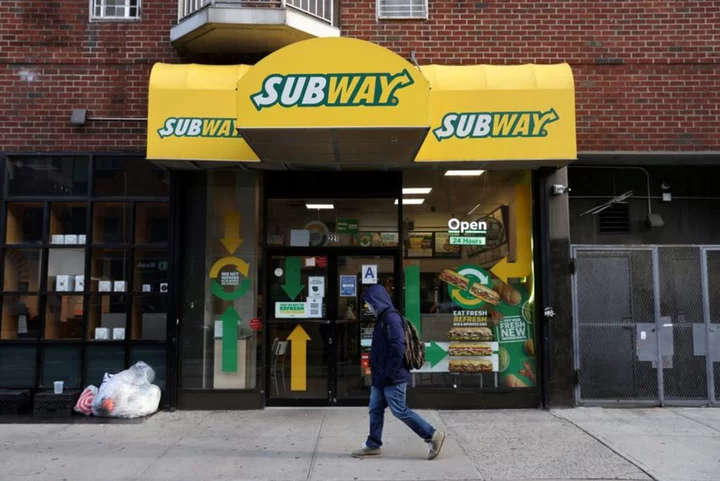Asian markets fell Wednesday on concerns about the Chinese economy and after stronger-than-expected US retail sales data increased the likelihood of a further Fed rate hike.
The bounce in July sales, boosted by online spending, showed that consumption has proven more robust than expected, even as the US economy cools.
Comments by Minneapolis Fed president Neel Kashkari also added to concerns that the US central bank is not yet done with rate hikes in its battle to tame inflation.
While inflation may be moving in the right direction, it is still higher than the Federal Reserve would like and it is too early to declare victory, said Kashkari, a member of the Fed's interest-rate-setting committee.
"I'm not ready to say that we're done, but I'm seeing positive signs," Kashkari told a conference in Minneapolis on Tuesday.
The central banker said he would need to see "convincing evidence" that inflation is coming down to the Fed's 2.0 percent target and that the central bank was a "long way" from cutting rates.
US stocks retreated on rate concerns and fresh worries over the banking sector after an analyst at ratings agency Fitch warned of the risks of a banking industry downgrade.
The Dow fell 1.0 percent while the broad-based S&P 500 dropped 1.2 percent and the tech-rich Nasdaq Composite Index declined by 1.1 percent.
"While a healthy consumer is often perceived as a good thing by markets, the surprising retail strength could raise questions about how far along the Fed is in its fight against inflation, as such high demand might suggest there is still room to go on the rates front," said Stephen Innes of SPI Asset Management.
- Banks cut China forecasts -
The overnight declines on Wall Street added to the risk-off sentiment in Asia, with data showing a further fall in Chinese new home prices in July adding to concerns about the world's second-largest economy, which has stumbled since emerging from its pandemic isolation.
Asian markets were well in the red, with Tokyo, Hong Kong, Seoul and Sydney all down more than 1.0 percent.
Shanghai, Taipei, Singapore, Bangkok and Jakarta also retreated, while Manila and Kuala Lumpur were the only gainers.
Figures released Wednesday by China's National Bureau of Statistics showed new home prices declined for a second month in July in a further indication of the problems facing the deeply-indebted property sector and the wider economy.
The data comes on top of a raft of weaker-than-expected figures on Tuesday showing slowing growth in retail sales and industrial production.
Several banks slashed their growth forecasts for China following the data, with JPMorgan Chase cutting its estimate for 2023 to 4.8 percent, well below an earlier forecast in May of 6.4 percent, Bloomberg reported. Barclays also cut its estimate to 4.5 percent.
The recent data suggests China may struggle to achieve its official five percent growth target set for the year.
The economy grew just 0.8 percent between the first and second quarters of 2023, according to official figures.
- Key figures around 0300 GMT -
Hong Kong - Hang Seng Index: DOWN 1.1 percent at 18,370.76
Shanghai - Composite: DOWN 0.1 percent at 1,983.57
Tokyo - Nikkei 225: DOWN 1.0 percent at 31,906.25
Euro/dollar: UP at $1.0908 from $1.0905 at 2050 GMT on Tuesday
Pound/dollar: DOWN at $1.2701 from $1.2704
Euro/pound: UP at 85.89 pence from 85.82 pence
Dollar/yen: DOWN at 145.54 from 145.57 yen
West Texas Intermediate: DOWN 0.2 percent at $80.82 per barrel
Brent North Sea crude: DOWN 0.25 percent at $84.68 per barrel
New York - Dow: DOWN 1.0 percent at 34,946.39 (close)
London - FTSE 100: DOWN 1.6 percent at 7,389.64 (close)
mtp/aha









